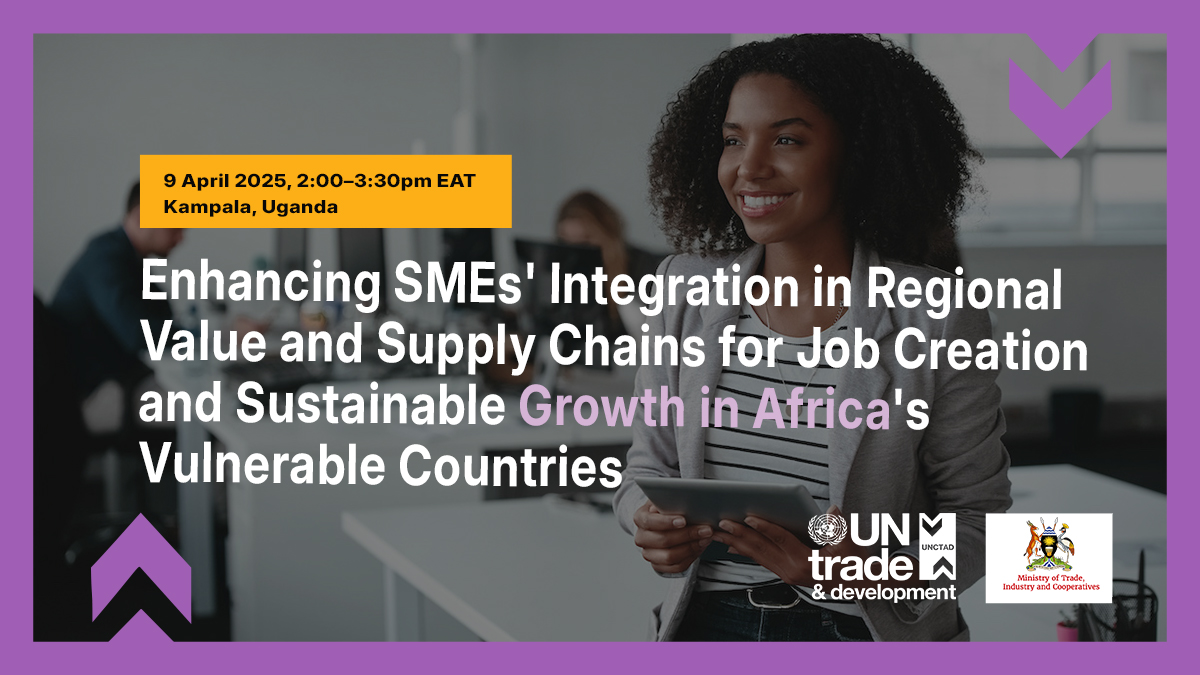On 9 April 2025, UN Trade and Development (UNCTAD), the Ministry of Trade, Industry and Cooperatives (MTIC) and the United Nations Resident Coordinator’s Office in Uganda jointly organized a virtual side event titled “Enhancing SMEs Integration in Regional Value and Supply Chains for Job Creation and Sustainable Growth in African Vulnerable Countries”, in the margins of the 11th Africa Regional Forum on Sustainable Development (ARFSD11).
The objective of the session was to explore actionable strategies to strengthen the participation of small and medium-sized enterprises (SMEs) in regional value and supply chains, as a pathway to job creation and sustainable growth across Africa’s most vulnerable economies.
Mr. Junior Davis, Director of the Policy Analysis and Research Branch at UNCTAD’s Division for Africa, Least Developed Countries and Special Programmes, opened the session by highlighting the economic vulnerabilities faced by African economies, including a 3% drop in FDI in 2023, a $400 billion SME financing gap, and only 16% intra-African trade. He emphasized that the AfCFTA presents a transformative opportunity to strengthen value chains, reduce non-tariff barriers, and crowd in regional capital through institutional investors and blended finance.
Ms. Habiba Ben Barka, Chief of the Africa Section at the UNCTAD’s Division for Africa, Least Developed Countries and Special Programmes, followed with a presentation of key findings from the 2024 Economic Development in Africa Report (EDAR), emphasizing the need to institutionalize risk frameworks for SMEs and invest in regional infrastructure, financial inclusion and digital trade systems.
The panel discussion offered multi-sectoral perspectives.
Mr. Andrew Mold - Chief of Regional Integration and the AfCFTA Cluster, at United Nations Economic Commission for Africa (UNECA) Subregional Office for East Africa - called attention to the lack of scale in African firms, arguing for greater support to medium and large enterprises that can drive regional integration and pull SMEs into value chains.
Mr. Fabian Kasi – Managing Director at Centenary Bank - highlighted the role of financial institutions in de-risking SME lending through long-term credit lines and digital banking platforms such as Centenary Mobile.
Mr. Qamar Saleem - Head of the SME Finance Forum - introduced emerging financing models, including tokenization, blended finance and blockchain to improve access to working capital and data trust. He emphasized that solving trust issues can unlock SME financing at scale.
From the private sector, Mrs. Tamara Egbedi – CEO and co founder of PachaMama Foods Nigeria - illustrated how locally sourced, quality-controlled production systems can meet international standards while delivering inclusive nutrition and employment outcomes. She stressed the importance of purpose-driven entrepreneurship as a way to access international markets.
Mr. David Ofosu-Dorte - Executive Chairman and Senior Partner at AB & David Africa - urged African governments to address systemic non-tariff barriers, harmonize standards and legally recognize SME aggregation models to meet export thresholds. He proposed legislative support for franchising and aggregation to expand SME participation in trade.
Ms. Briggette Harrington – CEO and President at Igire Continental Trading Company - showcased her firm’s success in consolidating products from SMEs across Africa and facilitating cross-border trade through strategic use of pan-African banking networks. She advocated for clear role delineation in trade ecosystems, where SMEs focus on production while trading firms manage export logistics and market access.
Overall, the session concluded that increasing SME participation in regional value chains requires urgent investment in infrastructure, regulatory harmonization, financial innovation and support for enterprises with the capacity to drive regional production and demand.
Panelists and online participants during the virtual side event on “Enhancing SMEs Integration in Regional Value and Supply Chains for Job Creation and Sustainable Growth in African Vulnerable Countries”, co-organized by UNCTAD and the Uganda Ministry of Trade, Industry and Cooperatives on 9 April 2025.
Small and Medium-sized Enterprises (SMEs) are central to Africa’s economic transformation, representing a significant share of employment, innovation and GDP. However, their integration into regional value and supply chains remains limited, particularly in vulnerable countries. This virtual side event emphasizes the importance of strengthening SMEs’ participation in regional markets as a pathway to job creation and inclusive economic growth, particularly under the African Continental Free Trade Area (AfCFTA).
Co-organized with the Uganda Ministry of Trade, Industry and Cooperatives, this side event will take place during the Eleventh Africa Regional Forum on Sustainable Development (ARFSD) to address the critical role of African SMEs in driving job creation and economic growth. The thematic focus of the session aligns with Agenda 2063 by reinforcing the role of SMEs as engines of sustainable development.
By addressing persistent challenges such as limited access to finance, regulatory barriers and infrastructure gaps, the panel discussion will delve into actionable policy solutions, innovative financing instruments and digital tools that can unlock SME potential. It will also showcase successful models of SME integration and facilitate dialogue between policymakers, private sector actors, financial institutions and development partners. The interactive session will include a Q&A segment to engage the audience.


